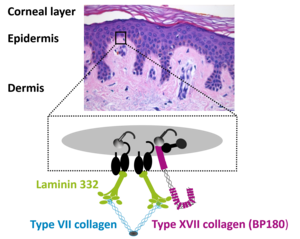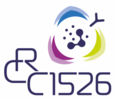Our Mission
The Collaborative Research Center (CRC) 1526 "Pathomechanisms of Antibody-mediated Autoimmunity (PANTAU) - Insights from Pemphigoid Diseases" aims to elucidate the pathogenesis of antibody-mediated autoimmune diseases and to develop new diagnostic and therapeutic strategies.
Why is it important to study autoimmune diseases?
Autoimmune diseases are chronic inflammatory disorders affecting approximately 8% of the population in industrialized countries. The pathogenesis of autoimmune diseases is multifaceted and only poorly understood. Current concepts suggest an interplay between genetic and different non-genetic factors leading to a dysregulated immune response directed against self-structures. Strategies to treat autoimmune diseases are unspecific and only partially effective. They still primarily rely on systemic immunosuppression, which can only suppress disease but is usually not curative and associated with severe side-effects, particularly with an increased susceptibility to infections. A thorough understanding of the pathogenesis of autoimmune diseases is a prerequisite to overcome these limitations and to develop more specific and, ultimately, curative therapeutic strategies. Studying a prototypical autoimmune disease, therefore, would provide crucial insides in the general mechanism that lead to the formation of autoimmune diseases.
Insights from Pemphigoid Diseases
Pemphigoid diseases are a group of prototypical organ-specific, antibody-driven autoimmune diseases. The autoantibodies target hemidesmosomal adhesion proteins of the dermal-epidermal junction (Figure 1). Thus, pemphigoid diseases affect the skin and its adjacent mucous membranes and lead to severe skin inflammation and tissue injuries typically presenting as subepidermal blisters. The incidence of pemphigoid diseases has sharply risen in recent decades. Thus, they constitute a growing health burden, which predominantly affects the elderly. The latter are particularly susceptible to the side-effects of immunosuppressive drugs. This probably contributes to the considerably increased mortality rate of patients with pemphigoid diseases.
What makes Pemphigoid Diseases prototypical antibody-driven autoimmune diseases?
The autoantigens of pemphigoid diseases are clearly defined, and the pathological significance of autoantibodies targeting these autoantigens has been unequivocally demonstrated. Furthermore, the clearly established cause–effect relationship between autoantibodies and disease combined with the exposition of inflammation on the body surface, facilitating continuous monitoring and manipulation. In addition, the established robust preclinical models and large patient cohorts allows to directly assess if gained insights from preclinical studies can be trasnferred to humans.
Together, these factors render pemphigoid diseases superb paradigm diseases to decipher the pathogenic principles of antibody-induced autoimmune diseases.







